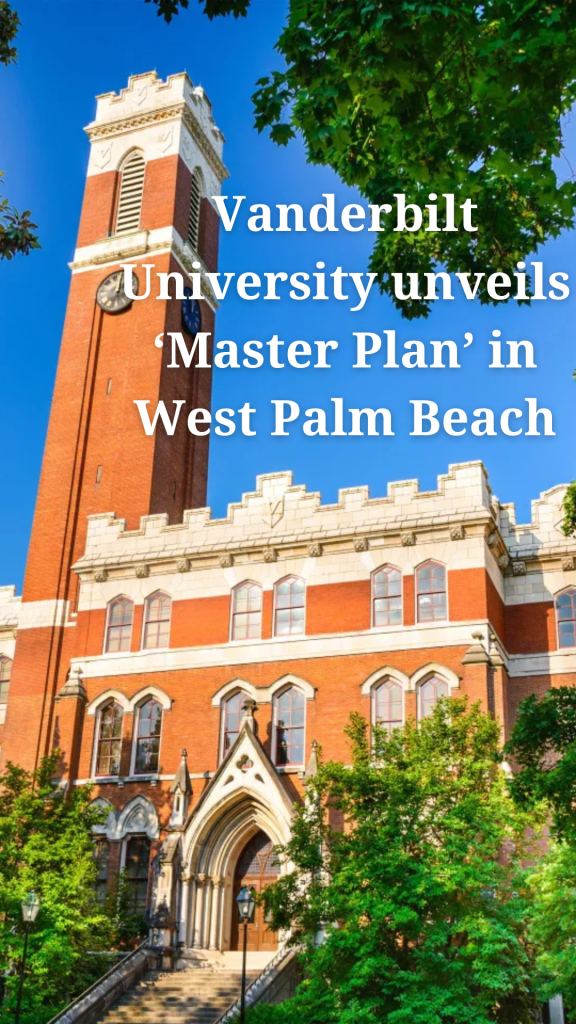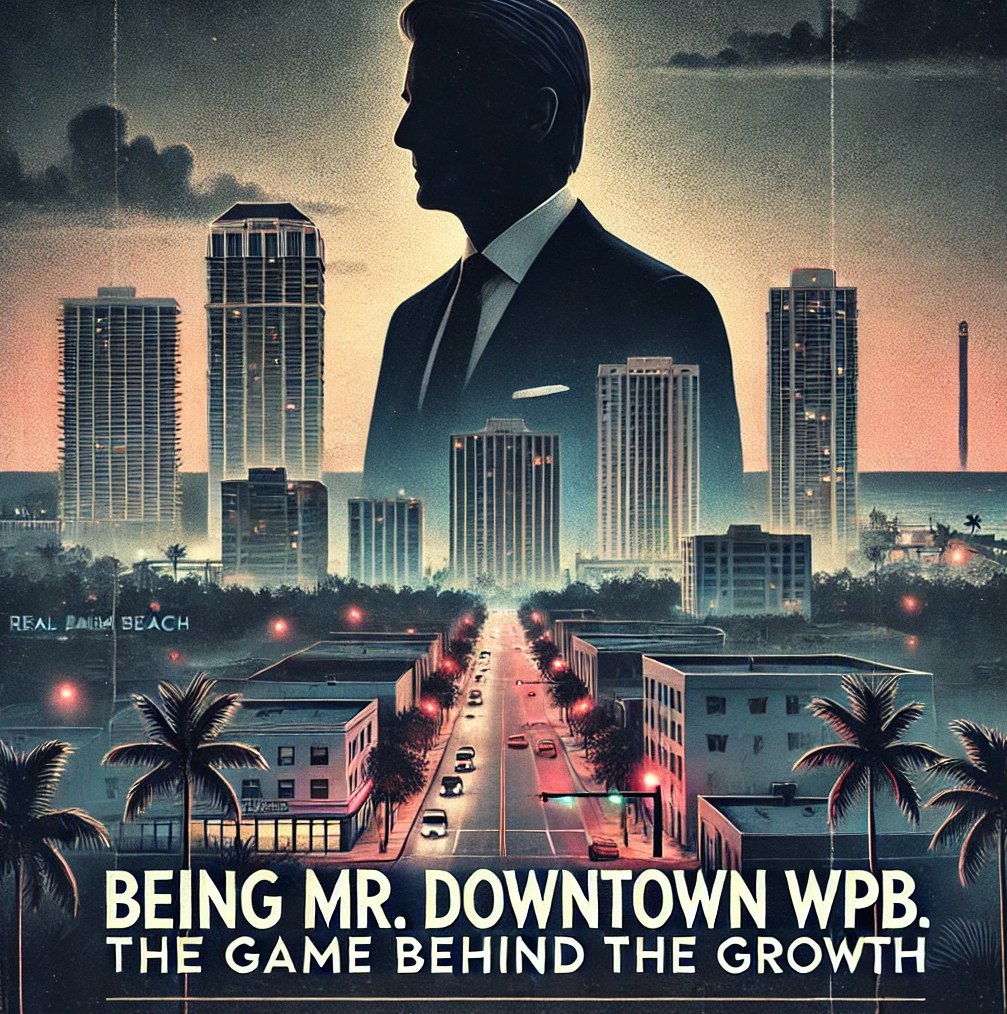by Anthony L. Pizzarelli
Lic. Fl. R.E. Broker
“Wall Street South❓❓ Sure w/ Harry Markopolos vibes.”
The Game Behind the Growth 🎩
January 2025
West Palm Beach (#WPB) is a city of breathtaking potential, sitting across from one of the wealthiest zip codes in the United States. From its palm-lined waterfront to the charm of Clematis Street and the promise of “Wall Street South,” the city often feels on the cusp of something extraordinary. Yet, decades of missed opportunities, perceived insider deals, and systemic inefficiencies have kept #WPB from its greatest potential yet.
I know because I’ve been in the trenches here for over 20 years. From simple tenant placement to multimillion-dollar development attempts, I’ve played my part in WPB’s story. Somewhere along the way, I became “Mr. Downtown WPB,” a nickname born out of early successes but now synonymous with a quest to set this super cool American city straight.
What follows isn’t just a story about real estate or politics. It’s about pulling back part of the curtain on how a city like West Palm Beach operates—how the government can act like a rogue HOA, how the people meant to serve us often serve themselves, and how We the People is just a small click-up-quorum away 🇺🇸

Clean Water is Cool Water 💧
Florida’s greatest asset—its water— also its most neglected. From its pristine beaches to its fragile Everglades, the state depends on this lifeblood for its environment, economy, and way of life. Yet time and again, water management and sustainability are overshadowed by headline-chasing projects that benefit the few rather than the many. West Palm Beach, with its outdated and increasingly unreliable water system, is a prime example of this mismanagement. Boil water alerts have become common & a long term remedy is still not defined.
Instead of tackling these fundamental issues, city and state leaders often prefer initiatives that sound great on paper but unravel under scrutiny. Take the recent Great Outdoors Initiative, a proposal from the Florida Department of Environmental Protection that promised to “improve” state parks. Beneath the glossy rhetoric, the plan included commercial add-ons like hotels, golf courses, and pickleball courts—developments that risked the natural integrity of these cherished public spaces.
When the plan was leaked, Floridians pushed back hard. And it worked. Public outrage stopped the initiative in its tracks, proving that when enough people demand accountability, even the most entrenched powers are forced to listen.
Here’s the part no one talks about: the power of citizens to “click up quorum” and drive real change. On Palm Beach Island, it takes just 900 people—less than a fraction of the population—to hit quorum for a recall, propose a bill, or reshape local policy. In West Palm Beach, it’s 12,000, and for the entire state of Florida, 900,000 citizens could move mountains. These aren’t insurmountable numbers. They’re entirely within reach.
In West Palm Beach, the same flawed playbook keeps repeating: sell the public a dream, deliver contracts to insiders, and ignore the real issues—like clean water, safe infrastructure & A rated schools.
The Three Amigos 👽
In 1991 #WPB switched to a strong mayor system where the Mayor really is the boss. Recent history has been shaped by three administrations, each prioritizing personal legacy over community-driven progress. Together, they’ve contributed to a culture where optics overshadow outcomes, leaving the city grappling with stagnation despite shiny headlines.
- Lois Frankel 2003-11: Frankel’s tenure as mayor was defined by her drive to leave behind grand, attention-grabbing projects, but these often came at a steep cost to the city’s functionality. Her crown jewel, the $100 million Mandel Library, is a prime example: an ill-conceived, bloated development that turned into a dead spot on historic Clematis Street. Rather than contributing to the vibrancy of downtown, the library disrupted the area’s flow and failed to generate the community engagement that would justify such a massive expenditure. It became a monument to Frankel’s ambition rather than a meaningful investment in the city’s future. Worse still, the library siphoned resources and attention away from critical issues like infrastructure, education, housing, and core economic development. Frankel’s focus on creating a physical legacy set a precedent for future administrations, where spectacle was valued over substance. After leaving office, she parlayed her tenure into a congressional career, where she’s rewarded for exemplifying the “level-up” culture of modern politics.
- Jeri Muoio 2011-19: Following Frankel, Muoio doubled down on projects that were heavy on disruption and light on tangible benefits. Her administration is remembered for the $30 million parks bond, approved as she left office. In my eyes this $30M Parks Bond Gig job Muoio gave herself walking out the door reeks of impropriety. She also championed initiatives like the Flagler Shore project and the Clematis Street redesign, both of which caused significant disruptions for residents and businesses while delivering mixed results at best. These efforts often felt more like self-congratulatory gestures than genuine attempts to address the city’s pressing needs.
- Keith James 2019-present: The current administration continues the trend, with James under scrutiny for systemic failures, most notably the police payroll scandal. This debacle exposed critical flaws in city management, highlighting a lack of oversight and accountability. Meanwhile, James has prioritized glamor projects like the waterfront marina attempt, which tell us how desperate City & County Council types are for good invites. Like prior Mayors James fails to address core issues like affordable housing, education. decaying infrastructure, and economic inequities. Notably as tenured city commissioner Mr. James per public record had severe Federal Tax delinquencies coming into office which makes one wonder how many other American elected officials are in personal financial straits while trying to boss the rest of us around?
Who’s the Real Mr. Downtown❓
This town has a history of pushing through big projects despite community opposition, and Ross has proven to be the perfect partner.
West Palm Beach owes much of its modern identity to Stephen Ross. As the visionary behind the CityPlace project in the late 1990s, Ross transformed a 72-acre blighted area into a vibrant mixed-use destination. His ability to execute large-scale urban development was a perfect match for a city that has long favored bold decisions over deep community input. Twenty-five years later, the imprint of Related Companies on West Palm Beach is undeniable—but so is the growing sense that Ross’s influence extends far beyond real estate.
CityPlace was just the beginning. Ross’s developments, including the convention center hotel, cemented his role as the city’s preferred developer for transformative projects. His contributions have undeniably brought economic vitality to the area. Yet, as his footprint has expanded, so have questions about whether the city’s reliance on Ross has come at a cost.
This dynamic crossed a line for me over the South Flagler House. While there is technically zero on the surface to be concerned about, Mr.Ross’s involvement seemed to come out of nowhere, raising questions about whether his influence extends beyond his portfolio into the broader market itself. Was this simply the move of a skilled player maximizing opportunities, or has Ross’s presence in West Palm Beach development created an uneven playing field where little happens without his nod of approval? BTW Ross~Boss, nearly double the price of the Penthouses if you’re still asking circa $75,000,000, reach for $10K a foot benchmark.
As a Phins-Phan Ross’s stewardship of the Miami Dolphins concerns me too. Despite being one of the most storied franchises in the NFL, the Dolphins have floundered under Ross’s ownership with a lifetime under -.500 record. Tua Tagovailoa, a hyper-talented quarterback whose repeated concussions raise serious concerns. Tua’s ongoing presence on the field feels reckless—a liability for both the team’s future and the player’s health. For a franchise with such a proud history the juice doesn’t feel worth the squeeze in the event Mr. Tagovailoa gets severely roughed up again.
Then there’s the Brian Flores lawsuit which Ross is defending. The allegations reflect a “win-at-all-costs” mentality that indicates prioritizing short-term gains over ethics and integrity. It’s not hard to see how this approach could extend to Ross’s dealings in West Palm Beach. For the record I would’ve kept Flores (8-2 w/ Vikings) one more year, the way that 2021 team turned a 1-7 start to a 9-8 season was worthy to continue.

Vanderbilt University: A Decision for the Citizens 🍏
The idea of Vanderbilt University bringing a campus to West Palm Beach is undeniably exciting—on paper. But the way this deal came together is the real issue. It wasn’t put to the citizens for a vote. Instead, it was fast tracked by the Palm Beach County and West Palm Beach commissions, whose actions seem more aligned with playing power broker than serving the public they represent. Must be a pretty cool invite as a past elected official who authorized $8-9 figure tax money disbursements.
Let’s be clear: this isn’t just about Vanderbilt. It’s about accountability. A project of this scale—one involving public land and carrying the potential to redefine the city’s future—should go to the ballot. The citizens of West Palm Beach deserve the opportunity to weigh in on whether this aligns with their vision for the community. Anything less reeks of the same unaccountable governance that has stifled the city’s potential for years.
What’s really happening here? The Vanderbilt deal appears to have been orchestrated by Stephen Ross. For better or worse, Ross’s ability to leverage his connections and influence has steam-rolled a project that could reshape the city’s identity. Yet, this very orchestration highlights the ongoing tension in West Palm Beach governance: decisions of monumental importance often emerge from boardrooms, not ballots.
It’s a thirst trap for elected officials who’ve lost their heads—lost in the sauce of operating in one of America’s most prestigious markets. Without the title of “commissioner,” many of these individuals would just be regular people. Instead, they wield power in a city where ambition often trumps accountability & the champagne campaign feels endless.
The commissions’ behavior should be a wake-up call. They need to be audited, not given free rein to decide the city’s future. This Vanderbilt deal is just the latest example of decisions made for political clout rather than the community’s benefit.
West Palm Beach deserves better than rushed approvals and closed-door deals. If Vanderbilt is going to shape our city, it should be with the people’s blessing—not as another top-down move from officials who’ve forgotten who they serve.
Missed Opportunities 💸
West Palm Beach’s story is riddled with what-ifs and missed opportunities, but none may loom larger than the Tent Site. Sitting on prime downtown real estate, this vacant parcel of land has become the most visible symbol of the city’s dysfunction. In 2015, I worked with a group of developers who were poised to transform this space into something extraordinary. These were no ordinary players—they are blue-blood American aristocrats, the kind of Forbes 100 elites whose vision and financial stability could have redefined West Palm Beach’s trajectory, nevermind finish the project.
They brought to the table a bold, fully funded plan to breathe life into the Tent Site, promising not just economic growth but cultural revitalization. This was the moment West Palm Beach could have stepped onto the national stage as a model for urban transformation. Instead, the local Principals were strung along, losing millions in the process. Instead the project was awarded to another developer who as of now has headlines indicating this property will remain vacant for years to come.
Today, the Tent Site remains fenced off and lifeless, a painful reminder of what could have been. The missed opportunity wasn’t just about a vacant lot—it was about sending a message to the world that West Palm Beach was ready to lead. Instead, the decision to prioritize politics over progress has left the city with nothing to show but rusting fences, lost potential & another technical deterrent to those that know the critical 1% difference, #WPB is a shallow place to do business.
My 2025 take on the Tent Site; turn it into an oversized decorative water fountain traffic roundabout; call it Integrity Circle once PBC / WPB commission has earnest members.
The Sunset Lounge follows a similar trajectory. Once a cornerstone of the city’s African American history, its planned renovation was supposed to cost just a few million dollars. Instead, it has ballooned into a $20 million + boondoggle, now mired in lawsuits and delays. A project that could have been a unifying cultural beacon has become yet another taxpayer-funded albatross. I have been on-top of this deal from the start. The city paid 6-12 times market for the property only after the sellers feared the city would just take it.
At 314 Clematis Street, a well-regarded local group, proposed a thoughtful redevelopment plan for the historic building. Their vision was rooted in community and creativity, offering a path to restore one of the most iconic properties downtown. Yet the city after an initial approval retracted their agreement. Even today the city could’ve sold the building for a profit and it still just sits there dead vacant in the middle of some of the world’s most desirable dirt.
Together, these three examples tell a damning story of West Palm Beach’s leadership. The Tent Site, Sunset Lounge, and 314 Clematis symbolize decisions that many see as prioritizing connections and short-term gains over sustainable growth.
The Heart of Clematis #Mayo4Mayor 💙
For decades, Rodney Mayo has been the beating heart of Clematis Street, embodying the kind of grassroots energy West Palm Beach desperately needs more of. His contributions to the city’s cultural and social scene go far beyond the clubs, coffee shops, and restaurants that have made him a household name. Respectable Street, his first venture, was the spark that ignited Clematis Street’s revival in the 1980s—a time when the area was far from the vibrant downtown it is today.
But Mayo isn’t just a businessman; he’s a community-builder. During the darkest days of the COVID-19 pandemic, while city leaders were busy drafting press releases, Mayo took action. He founded Hospitality Helping Hands (H3), a non-profit that stepped up to feed thousands of people in need when everything else in the city seemed to shut down. Operating out of Howley’s Restaurant, one of his beloved establishments, H3 served over 16,000 meals in its first week alone, proving that real leadership doesn’t always wear a suit.
Our paths crossed late at night, in the bustling weekend hours when Rodney’s clubs hummed with life. Those moments became an unlikely meeting ground for us to bond and strategize. While Rodney’s world thrives on late-night energy, mine has been shaped by decades of navigating the city’s twists and turns we made for good counter perspectives. We’d muse over the challenges of West Palm Beach, dream up solutions, and occasionally clash over approaches. I shared my #WE10 vision with him early on, but it wasn’t until his own experiences with the city’s bureaucracy that he began to see its potential.
Rodney’s foray into politics was a bold move—one that we supported wholeheartedly. I stepped back from another candidate I’d prepared to run for mayor because Rodney’s passion for the city deserved its moment. While he may have ultimately found himself out of his depth in the political trenches, his efforts reminded me of why West Palm Beach’s grassroots energy is its most valuable asset.
Rodney’s mayoral bid was derailed when Keith James challenged his eligibility over a technicality, leading to his removal from the ballot. Our own Mayor sued our own city, county & supervisor election, let that sink in please. The most disturbing part of that election cycle was watching ALL the commissioners double down to take the election way from West Palm Beach voters. It was at this very moment I knew they too were all in on West Palm Beach corruption.
Rodney Mayo is a symbol of what West Palm Beach can be: a city fueled by creativity, inclusivity, and community. His late-night world and grassroots passion offer a stark contrast to the sterile, insider-driven politics that have held the city back. If the future of West Palm Beach has a pulse, it’s people like Rodney who keep it beating.
County Cover-Up: a DECADE of Deflection & Insider Protection 👽
For over a decade, I’ve been raising the alarm. I’ve filed complaints, approached the Palm Beach Inspector General (PBIG), the county’s ethics board, county commissioners, and even the State Attorney’s office. Yet, every time, I’ve hit the same wall. My grievances have been met with silence, deflection, or a polite, hollow promise to “look into it.” Nothing ever comes of it.
The system isn’t just broken—it’s actively protecting itself. It’s no coincidence that the city of West Palm Beach can operate like a rogue HOA; it’s because the county allows it. The county is the safety net that’s supposed to catch bad behavior, but instead, it’s a trampoline, bouncing accountability right back to the city without consequence.
When my Homie Rodney Mayo ran for mayor, the system found a way to keep him off the ballot. This isn’t governance—it’s gatekeeping. The county and its officials are more interested in covering for their friends than doing their jobs. Dave Aronberg’s office is a prime example. As State Attorney, he’s supposed to be a watchdog for justice, yet my attempts to engage with him have been nothing but performative. I followed up on key matters, only to be sent through staged runarounds designed to seem responsive but achieve nothing. Aronberg’s transition from a hands-on public servant to a media-savvy talking head perfectly encapsulates America’s leadership. Once known for solid work on housing and the sober homes crisis, he now seems more interested in critiquing Trump on TV than ensuring clean, functional governance in his own courthouse. Rumor has it he’s eyeing a run for governor, but America doesn’t need more ego-driven drama; it needs stoic, steady, calm, confident, low key elected officials please.
The county commissioners and district representatives are no better. Despite years of outreach, they’ve perfected the art of the non-response. They’ll dodge your emails, ghost your follow-ups, and, when cornered, offer vague reassurances with no action. It’s all part of a larger culture of complicity. No one wants to disrupt the apple cart because they’re all vying for their next invite—to the next event, the next campaign, the next rung up the ladder. Digging deeper, many of these elected positions offer perks and benefits comparable to those in high-level corporate roles, raising questions about public accountability. Rep or Dem, most elected officials are there for the money and the perks, the USA stuff seems to be secondary.
Palm Beach County is one of only 18% of U.S. counties that thought Kamala Harris was a good idea for president. That statistic isn’t just a political footnote—it’s a reflection of the county’s intake-and-retry mindset. This is a place where leadership doesn’t take risks or make waves; they play safe, cover for each other, and hope the voters don’t notice the cracks beneath the surface.
This behavior has gone on long enough. It’s time for state and federal agencies to step in and hold Palm Beach County and West Palm Beach accountable. Their games are over. It’s time for #Audit561—a comprehensive review of their operations, finances, and decision-making. The people of this region deserve transparency, integrity, and leadership that works for them, not against them. Anything less is unacceptable.
Broadcasting is a Privilege
Once, #MrDTwpb was a local media darling. My work in real estate—revitalizing properties, filling vacancies, and building West Palm Beach’s downtown identity—was celebrated in glowing features and TV segments. But when I started challenging the system, the narrative shifted. The media that once praised my contributions turned its back, choosing to protect city hall over pursuing the truth.
Take the incident at the Sunset Lounge and 314 Clematis Street hearing. I was having a respectful conversation when Commissioner Shalonda Warren approached, interrupted me, and dismissed me with a wave of her hand. Two weeks later, during a commission meeting, Warren doubled down, falsely claiming under oath that I had verbally assaulted her.
The next day, the Palm Beach Post, owned by Gannett News Corp, called me. They weren’t looking for the truth—they were building a narrative. They twisted a comment I made in the private Engage West Palm Beach Facebook group out of context, publishing a racially charged piece that painted me as the aggressor. The article wasn’t just a smear—it was an intentional attempt to discredit me and protect their allies in city hall.
Months later, I obtained CCTV footage proving I’d done nothing wrong. Yet my attempts to share it on Engage WPB were blocked. Admin Aaron Wormus removed me from the group at a critical moment, silencing my voice and ensuring the footage couldn’t reach the community. This wasn’t just censorship—it was gatekeeping on behalf of the establishment. He also blocked me out just before the Paula Ryan & Keith James Mayoral election where I promoted P. Ryan as best of the worst candidates.
For years, I’ve watched Engage WPB function as a soft power tool for the city. In my view, Wormus’s actions seemed to favor establishment interest, whether intentionally or coincidently. Worse, his management of the group raises questions about whether he’s skirting Facebook’s own terms of service aiding the city to steal.
Meanwhile, Gannett News Corp, once a dominant force in local journalism, has seen its stock plummet—from $25 a share to a low of $2 before a modest rebound to $5. These numbers tell the story of a company that’s lost its way, abandoning journalistic integrity in favor of protecting power. If Gannett doesn’t want to tell the truth, maybe it’s time for an ethical company to step in and replace them in the 561 marketplace; I hear the Tampa Bay Times is honorable. West Palm Beach deserves media that works for the people, not for the establishment please.
This dynamic mirrors what we see with legacy media outlets and digital platforms alike. Journalism is meant to shine a light, not cast shadows. Broadcasting is not a right—it’s a privilege, and when media outlets fail to meet their obligations, they should face consequences.
That’s where #WE10 comes in. Perhaps citizen initiative could provide real stakeholders with the tools to revoke broadcast licenses one market at a time, forcing media outlets to level up their honor or step aside.
America is an H.O.A. 🏠
West Palm Beach / America operates like an HOA—an exclusive group of voted-in decision-makers wielding disproportionate power, often without meaningful oversight. The city’s charters and commissions function as its condo declarations, shaping how decisions are made, and like any HOA, they can be amended.
Tucked away in city, county, and state charters are mechanisms that allow citizens to act—not just to vote, but to write and propose laws, amend policies, and even recall officials. These aren’t abstract ideas; they’re real tools. And they’re drastically underutilized & modern day elected officials don’t want you to know about citizen quorums aka “We the People.”
There are the rules to know in Florida:
#WE10
https://www.flsenate.gov/laws/constitution#A11
#RECALLS
https://www.flsenate.gov/Laws/Statutes/2021/0100.361
Section 3, 4 & 5
#PROCESS
https://www.flsenate.gov/Laws/Statutes/2021/0100.371
My hypothesis is America chills out soon as we put CITIZEN QUORUM RECALL & BALLOT INITIATIVE THRESHOLDS in the U.S. Census. Imagine looking at census data and immediately seeing how many registered voters are needed to propose a bill, amend policies, or recall an official in your area. Considering the average U.S. City per Google is 6,000, we are talking an average of a school-gym-full of registered voters keeping the government ACCOUNTABLE one city, county, state at a time. This simple addition should transform governance into something tangible and actionable for every community, every American.
Right Place, Right Time 🌎
West Palm Beach is the perfect place to lead this charge. With #UncleTrumpy & Mar-a-Lago just across the water and figures like Elon Musk coming to town, the #Gr8r561 region is under a national spotlight like never before. This isn’t just an opportunity—it’s the chance to demonstrate how citizen-driven governance can transform a community, a nation.
Picture West Palm Beach and Palm Beach County as a protocol region for governance reform. There’s enough pbc/wpb suspicion to launch a State & Federal Audit, freezing all excess spending, exposing inefficiencies, replacing both city and county commissions in full setting the stage for meaningful & enduring change. From there, tools like #WE10 empowers citizens to hold elected officials accountable delivering them the American experience they want.
#Gr8rWPB is about more than one city or one county. It’s about reshaping the relationship between citizens and their governments across the country. By catching a national vibe, showing the power of quorum, and integrating it into the U.S. Census, Americans can truly live their lives how they see fit.
From #MrDTWPB to #MrUSa: Turning Chaos into Chorus 🎶
My father taught me that honesty matters—you pay for your newspaper and take only one. Wayne Huizenga once told me, “Work hard, kid; shortcuts are for dreamers.” Those lessons shaped me, from hustling $500-a-month rentals to building a career that’s now focused on something much bigger: holding power accountable and making sure West Palm Beach fulfills its extraordinary promise.
Being “Mr. Downtown WPB” isn’t just a nickname—it’s a vantage point, offering a clear view of a city that has danced on the edge of greatness but been held back by mismanagement and self-serving politics. These struggles aren’t unique to West Palm Beach; they’re symptoms of a larger system in need of reform. The tools to fix it are here—citizen quorums, recalls, ballot initiatives—but they’ve been buried beneath apathy and a system designed to protect itself.
That’s changing. Slowly but surely, people are waking up. Across Florida and beyond, momentum is building for #WE10—a simple but powerful concept: real power belongs to the people who claim it. I’ve already started working behind the scenes, identifying candidates who understand this and are ready to lead with integrity. This isn’t just about one city; it’s about setting an example that resonates statewide and beyond.
In West Palm Beach, the message is clear: change is coming, one way or the next. Whether it’s through investigative bodies, legal maneuvers, or citizen-driven initiatives, the days of unchecked power are numbered. The same playbook of insider deals and ignored accountability has run its course. It’s time for a new chapter—one where the people of this city, this state, and this nation take back the reins.
The world is watching WPB now more than ever. With its proximity to Mar-a-Lago, its burgeoning financial sector, and its potential as a reform prototype, this city has an opportunity to lead by example. It’s not just about turning chaos into chorus here; it’s about showing how communities everywhere can rise together. The tools are in our hands. The future is ours to shape 💫
by Anthony L. Pizzarelli
Lic. Fl. R.E. Broker





